Constitutional Law: Analyzing the Scope of Commonwealth Authority
VerifiedAdded on 2023/06/14
|11
|2441
|66
Case Study
AI Summary
This case study examines the constitutional validity of two Commonwealth acts, the Scholarships and Postgraduates Act 2016 (Cth) (‘SAGA’) and the Grants for Australian Students Act 2016 (Cth) (‘GASA’), in relation to Victorian State University Pty Ltd. The analysis focuses on whether the Commonwealth can regulate corporations functioning in the education sector under Section 51(xx) of the Australian Constitution and whether it can directly provide financial assistance to entities, bypassing state governments. The study refers to key legal precedents such as Adamson’s case, Strickland v Rocla Concrete Pipes Ltd, and Commonwealth v Tasmania to argue that SAGA is constitutional as it relates to trading activities. Similarly, it cites Victoria v The Commonwealth and Hayden and Pape v Commissioner of Taxation to support the constitutional validity of GASA, asserting the Commonwealth's power to directly allocate grants under specific legislative provisions. The case study concludes that both acts are likely constitutional, holding Victorian State University liable under their provisions. Desklib provides access to similar solved assignments and resources for students.
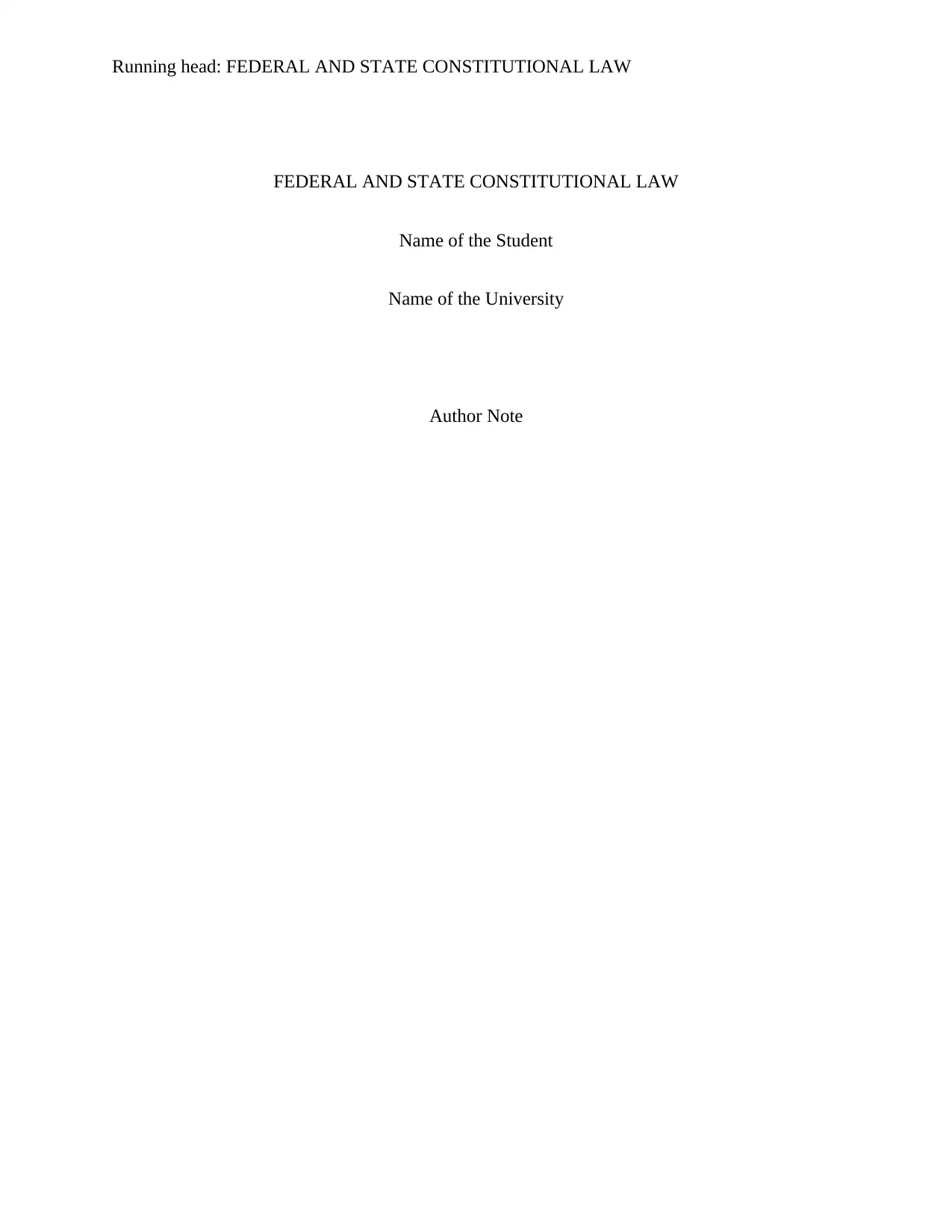
Running head: FEDERAL AND STATE CONSTITUTIONAL LAW
FEDERAL AND STATE CONSTITUTIONAL LAW
Name of the Student
Name of the University
Author Note
FEDERAL AND STATE CONSTITUTIONAL LAW
Name of the Student
Name of the University
Author Note
Paraphrase This Document
Need a fresh take? Get an instant paraphrase of this document with our AI Paraphraser
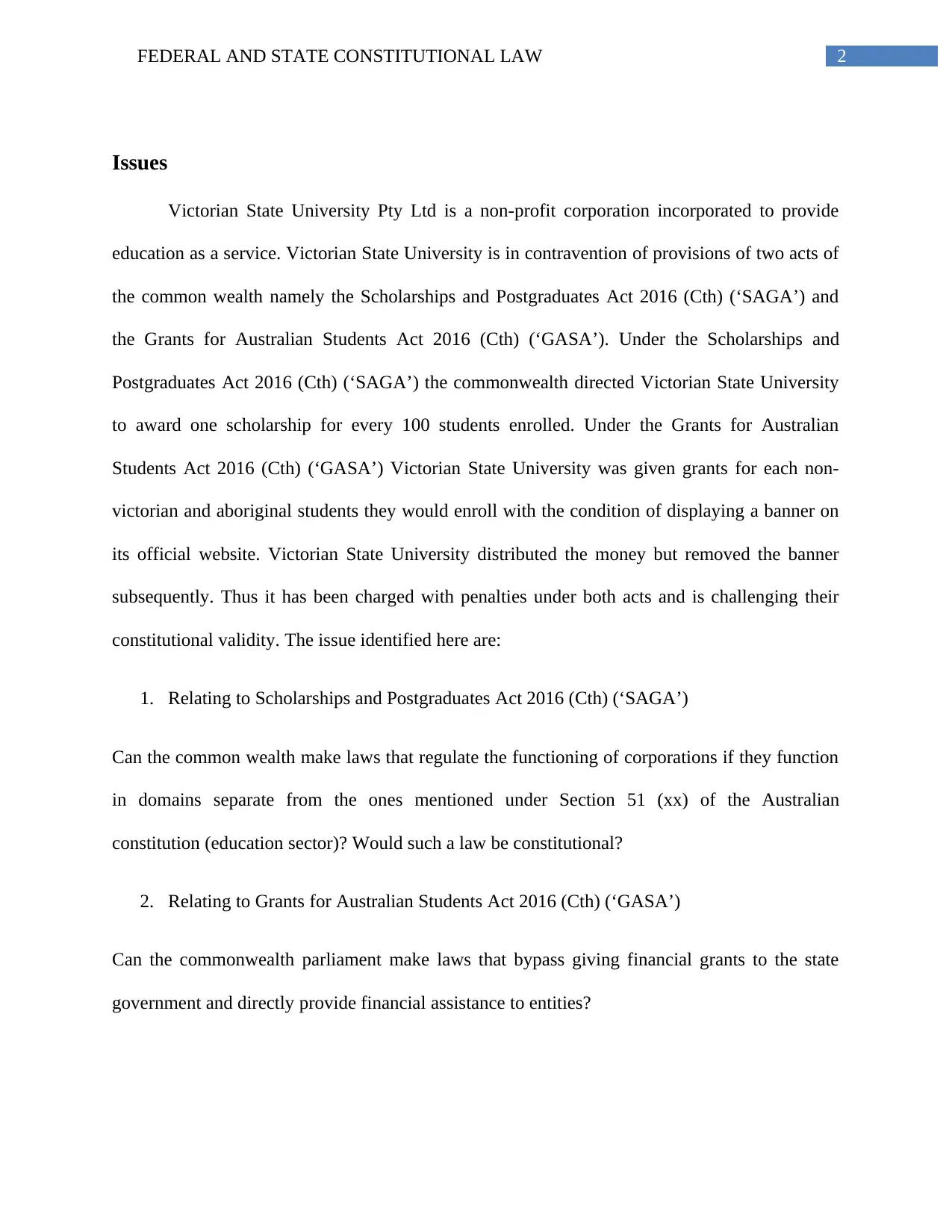
2FEDERAL AND STATE CONSTITUTIONAL LAW
Issues
Victorian State University Pty Ltd is a non-profit corporation incorporated to provide
education as a service. Victorian State University is in contravention of provisions of two acts of
the common wealth namely the Scholarships and Postgraduates Act 2016 (Cth) (‘SAGA’) and
the Grants for Australian Students Act 2016 (Cth) (‘GASA’). Under the Scholarships and
Postgraduates Act 2016 (Cth) (‘SAGA’) the commonwealth directed Victorian State University
to award one scholarship for every 100 students enrolled. Under the Grants for Australian
Students Act 2016 (Cth) (‘GASA’) Victorian State University was given grants for each non-
victorian and aboriginal students they would enroll with the condition of displaying a banner on
its official website. Victorian State University distributed the money but removed the banner
subsequently. Thus it has been charged with penalties under both acts and is challenging their
constitutional validity. The issue identified here are:
1. Relating to Scholarships and Postgraduates Act 2016 (Cth) (‘SAGA’)
Can the common wealth make laws that regulate the functioning of corporations if they function
in domains separate from the ones mentioned under Section 51 (xx) of the Australian
constitution (education sector)? Would such a law be constitutional?
2. Relating to Grants for Australian Students Act 2016 (Cth) (‘GASA’)
Can the commonwealth parliament make laws that bypass giving financial grants to the state
government and directly provide financial assistance to entities?
Issues
Victorian State University Pty Ltd is a non-profit corporation incorporated to provide
education as a service. Victorian State University is in contravention of provisions of two acts of
the common wealth namely the Scholarships and Postgraduates Act 2016 (Cth) (‘SAGA’) and
the Grants for Australian Students Act 2016 (Cth) (‘GASA’). Under the Scholarships and
Postgraduates Act 2016 (Cth) (‘SAGA’) the commonwealth directed Victorian State University
to award one scholarship for every 100 students enrolled. Under the Grants for Australian
Students Act 2016 (Cth) (‘GASA’) Victorian State University was given grants for each non-
victorian and aboriginal students they would enroll with the condition of displaying a banner on
its official website. Victorian State University distributed the money but removed the banner
subsequently. Thus it has been charged with penalties under both acts and is challenging their
constitutional validity. The issue identified here are:
1. Relating to Scholarships and Postgraduates Act 2016 (Cth) (‘SAGA’)
Can the common wealth make laws that regulate the functioning of corporations if they function
in domains separate from the ones mentioned under Section 51 (xx) of the Australian
constitution (education sector)? Would such a law be constitutional?
2. Relating to Grants for Australian Students Act 2016 (Cth) (‘GASA’)
Can the commonwealth parliament make laws that bypass giving financial grants to the state
government and directly provide financial assistance to entities?
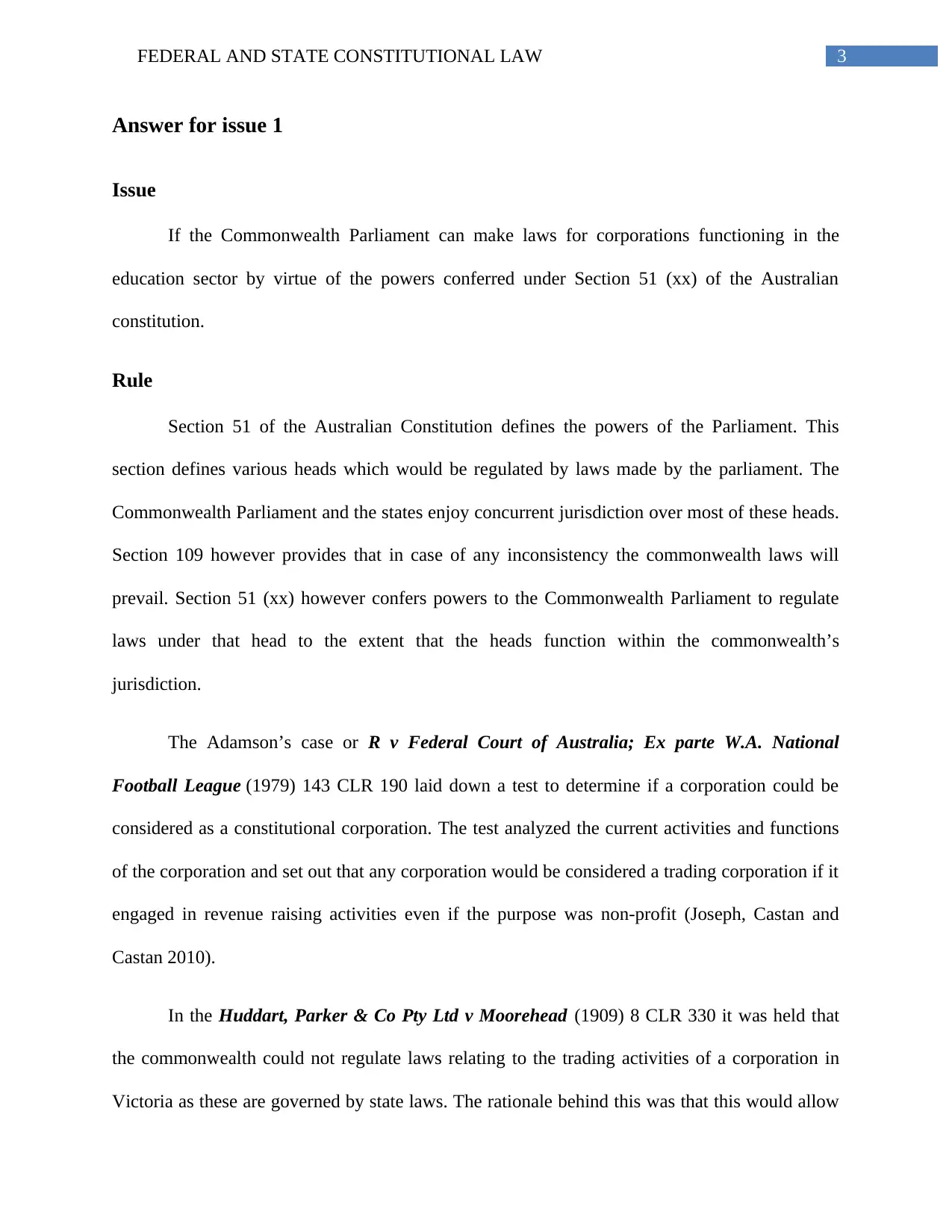
3FEDERAL AND STATE CONSTITUTIONAL LAW
Answer for issue 1
Issue
If the Commonwealth Parliament can make laws for corporations functioning in the
education sector by virtue of the powers conferred under Section 51 (xx) of the Australian
constitution.
Rule
Section 51 of the Australian Constitution defines the powers of the Parliament. This
section defines various heads which would be regulated by laws made by the parliament. The
Commonwealth Parliament and the states enjoy concurrent jurisdiction over most of these heads.
Section 109 however provides that in case of any inconsistency the commonwealth laws will
prevail. Section 51 (xx) however confers powers to the Commonwealth Parliament to regulate
laws under that head to the extent that the heads function within the commonwealth’s
jurisdiction.
The Adamson’s case or R v Federal Court of Australia; Ex parte W.A. National
Football League (1979) 143 CLR 190 laid down a test to determine if a corporation could be
considered as a constitutional corporation. The test analyzed the current activities and functions
of the corporation and set out that any corporation would be considered a trading corporation if it
engaged in revenue raising activities even if the purpose was non-profit (Joseph, Castan and
Castan 2010).
In the Huddart, Parker & Co Pty Ltd v Moorehead (1909) 8 CLR 330 it was held that
the commonwealth could not regulate laws relating to the trading activities of a corporation in
Victoria as these are governed by state laws. The rationale behind this was that this would allow
Answer for issue 1
Issue
If the Commonwealth Parliament can make laws for corporations functioning in the
education sector by virtue of the powers conferred under Section 51 (xx) of the Australian
constitution.
Rule
Section 51 of the Australian Constitution defines the powers of the Parliament. This
section defines various heads which would be regulated by laws made by the parliament. The
Commonwealth Parliament and the states enjoy concurrent jurisdiction over most of these heads.
Section 109 however provides that in case of any inconsistency the commonwealth laws will
prevail. Section 51 (xx) however confers powers to the Commonwealth Parliament to regulate
laws under that head to the extent that the heads function within the commonwealth’s
jurisdiction.
The Adamson’s case or R v Federal Court of Australia; Ex parte W.A. National
Football League (1979) 143 CLR 190 laid down a test to determine if a corporation could be
considered as a constitutional corporation. The test analyzed the current activities and functions
of the corporation and set out that any corporation would be considered a trading corporation if it
engaged in revenue raising activities even if the purpose was non-profit (Joseph, Castan and
Castan 2010).
In the Huddart, Parker & Co Pty Ltd v Moorehead (1909) 8 CLR 330 it was held that
the commonwealth could not regulate laws relating to the trading activities of a corporation in
Victoria as these are governed by state laws. The rationale behind this was that this would allow
⊘ This is a preview!⊘
Do you want full access?
Subscribe today to unlock all pages.

Trusted by 1+ million students worldwide
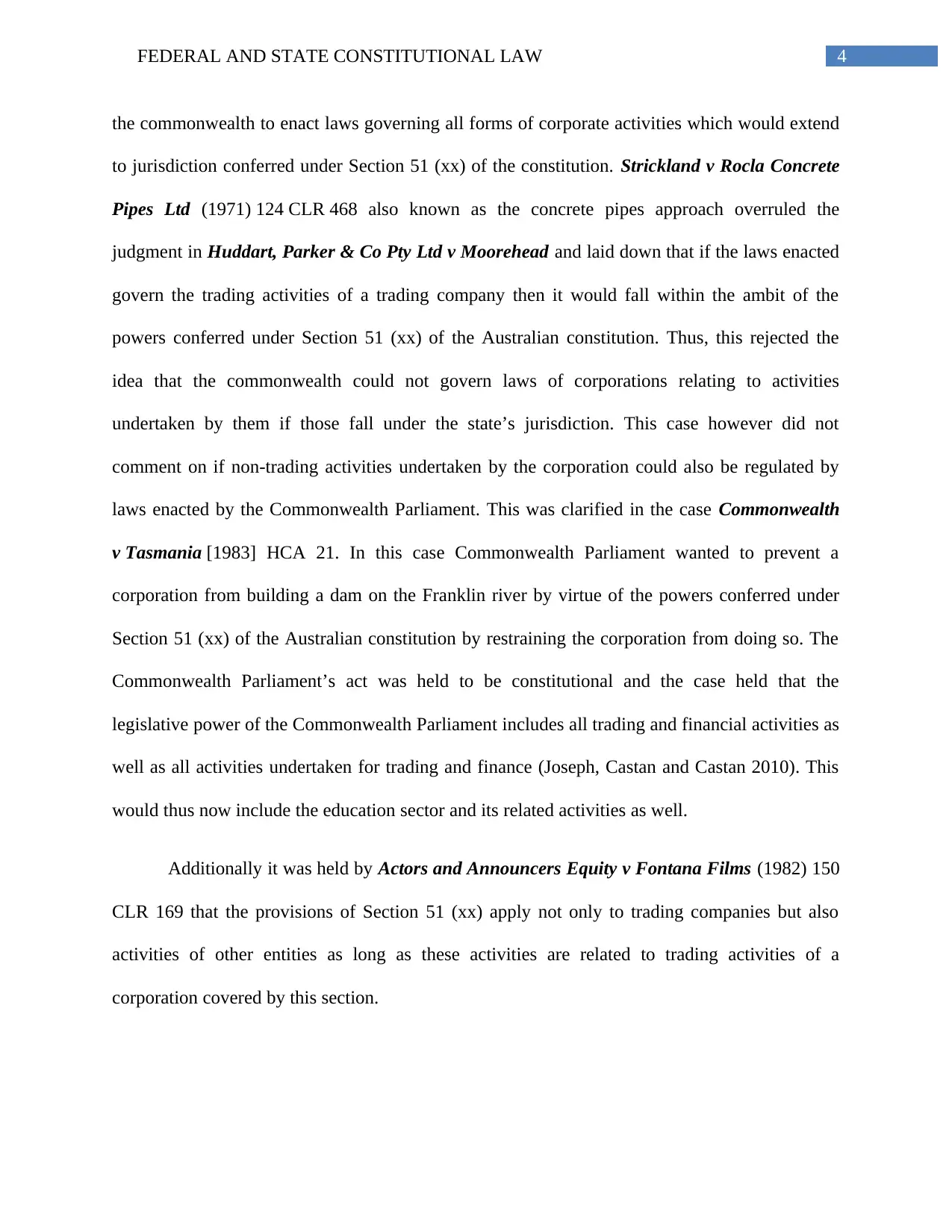
4FEDERAL AND STATE CONSTITUTIONAL LAW
the commonwealth to enact laws governing all forms of corporate activities which would extend
to jurisdiction conferred under Section 51 (xx) of the constitution. Strickland v Rocla Concrete
Pipes Ltd (1971) 124 CLR 468 also known as the concrete pipes approach overruled the
judgment in Huddart, Parker & Co Pty Ltd v Moorehead and laid down that if the laws enacted
govern the trading activities of a trading company then it would fall within the ambit of the
powers conferred under Section 51 (xx) of the Australian constitution. Thus, this rejected the
idea that the commonwealth could not govern laws of corporations relating to activities
undertaken by them if those fall under the state’s jurisdiction. This case however did not
comment on if non-trading activities undertaken by the corporation could also be regulated by
laws enacted by the Commonwealth Parliament. This was clarified in the case Commonwealth
v Tasmania [1983] HCA 21. In this case Commonwealth Parliament wanted to prevent a
corporation from building a dam on the Franklin river by virtue of the powers conferred under
Section 51 (xx) of the Australian constitution by restraining the corporation from doing so. The
Commonwealth Parliament’s act was held to be constitutional and the case held that the
legislative power of the Commonwealth Parliament includes all trading and financial activities as
well as all activities undertaken for trading and finance (Joseph, Castan and Castan 2010). This
would thus now include the education sector and its related activities as well.
Additionally it was held by Actors and Announcers Equity v Fontana Films (1982) 150
CLR 169 that the provisions of Section 51 (xx) apply not only to trading companies but also
activities of other entities as long as these activities are related to trading activities of a
corporation covered by this section.
the commonwealth to enact laws governing all forms of corporate activities which would extend
to jurisdiction conferred under Section 51 (xx) of the constitution. Strickland v Rocla Concrete
Pipes Ltd (1971) 124 CLR 468 also known as the concrete pipes approach overruled the
judgment in Huddart, Parker & Co Pty Ltd v Moorehead and laid down that if the laws enacted
govern the trading activities of a trading company then it would fall within the ambit of the
powers conferred under Section 51 (xx) of the Australian constitution. Thus, this rejected the
idea that the commonwealth could not govern laws of corporations relating to activities
undertaken by them if those fall under the state’s jurisdiction. This case however did not
comment on if non-trading activities undertaken by the corporation could also be regulated by
laws enacted by the Commonwealth Parliament. This was clarified in the case Commonwealth
v Tasmania [1983] HCA 21. In this case Commonwealth Parliament wanted to prevent a
corporation from building a dam on the Franklin river by virtue of the powers conferred under
Section 51 (xx) of the Australian constitution by restraining the corporation from doing so. The
Commonwealth Parliament’s act was held to be constitutional and the case held that the
legislative power of the Commonwealth Parliament includes all trading and financial activities as
well as all activities undertaken for trading and finance (Joseph, Castan and Castan 2010). This
would thus now include the education sector and its related activities as well.
Additionally it was held by Actors and Announcers Equity v Fontana Films (1982) 150
CLR 169 that the provisions of Section 51 (xx) apply not only to trading companies but also
activities of other entities as long as these activities are related to trading activities of a
corporation covered by this section.
Paraphrase This Document
Need a fresh take? Get an instant paraphrase of this document with our AI Paraphraser
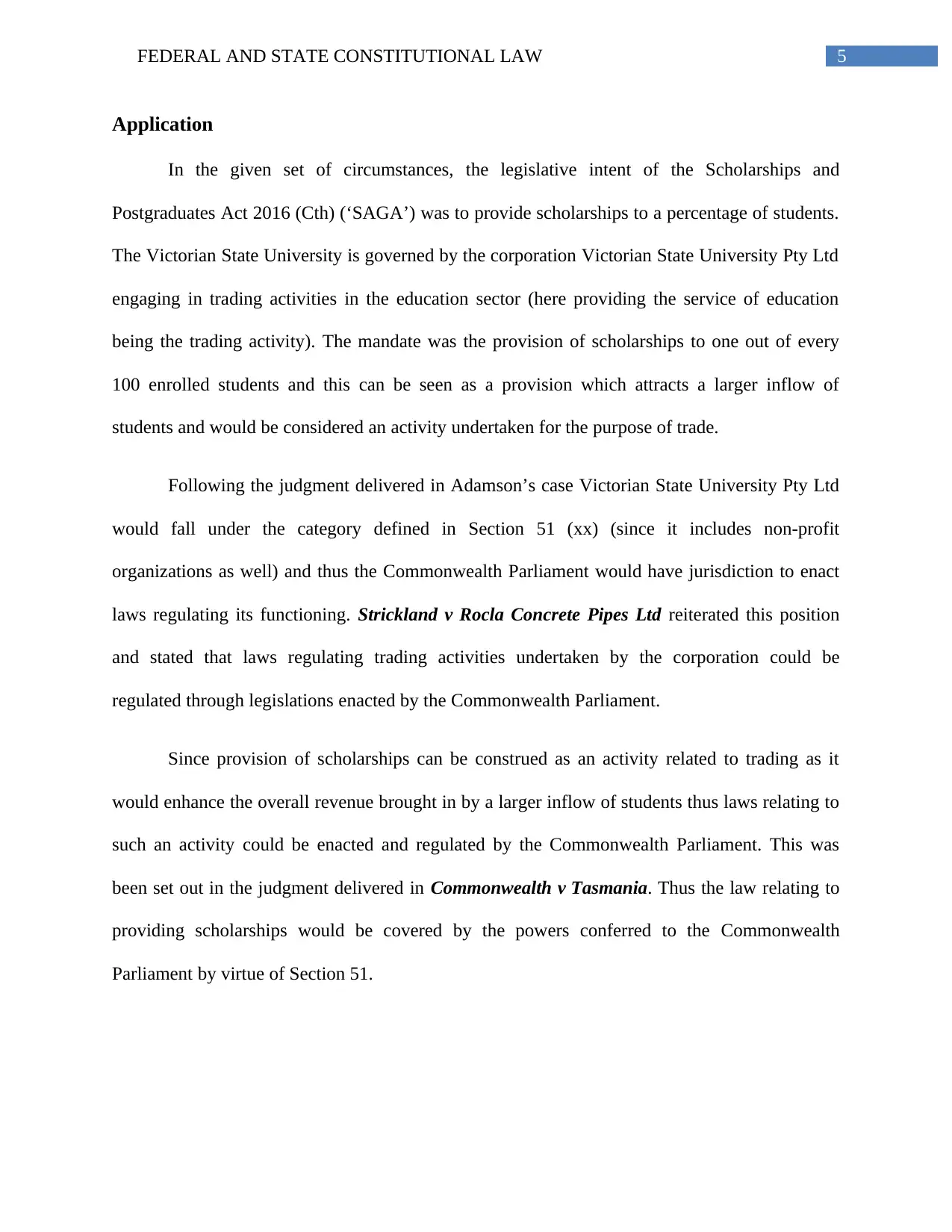
5FEDERAL AND STATE CONSTITUTIONAL LAW
Application
In the given set of circumstances, the legislative intent of the Scholarships and
Postgraduates Act 2016 (Cth) (‘SAGA’) was to provide scholarships to a percentage of students.
The Victorian State University is governed by the corporation Victorian State University Pty Ltd
engaging in trading activities in the education sector (here providing the service of education
being the trading activity). The mandate was the provision of scholarships to one out of every
100 enrolled students and this can be seen as a provision which attracts a larger inflow of
students and would be considered an activity undertaken for the purpose of trade.
Following the judgment delivered in Adamson’s case Victorian State University Pty Ltd
would fall under the category defined in Section 51 (xx) (since it includes non-profit
organizations as well) and thus the Commonwealth Parliament would have jurisdiction to enact
laws regulating its functioning. Strickland v Rocla Concrete Pipes Ltd reiterated this position
and stated that laws regulating trading activities undertaken by the corporation could be
regulated through legislations enacted by the Commonwealth Parliament.
Since provision of scholarships can be construed as an activity related to trading as it
would enhance the overall revenue brought in by a larger inflow of students thus laws relating to
such an activity could be enacted and regulated by the Commonwealth Parliament. This was
been set out in the judgment delivered in Commonwealth v Tasmania. Thus the law relating to
providing scholarships would be covered by the powers conferred to the Commonwealth
Parliament by virtue of Section 51.
Application
In the given set of circumstances, the legislative intent of the Scholarships and
Postgraduates Act 2016 (Cth) (‘SAGA’) was to provide scholarships to a percentage of students.
The Victorian State University is governed by the corporation Victorian State University Pty Ltd
engaging in trading activities in the education sector (here providing the service of education
being the trading activity). The mandate was the provision of scholarships to one out of every
100 enrolled students and this can be seen as a provision which attracts a larger inflow of
students and would be considered an activity undertaken for the purpose of trade.
Following the judgment delivered in Adamson’s case Victorian State University Pty Ltd
would fall under the category defined in Section 51 (xx) (since it includes non-profit
organizations as well) and thus the Commonwealth Parliament would have jurisdiction to enact
laws regulating its functioning. Strickland v Rocla Concrete Pipes Ltd reiterated this position
and stated that laws regulating trading activities undertaken by the corporation could be
regulated through legislations enacted by the Commonwealth Parliament.
Since provision of scholarships can be construed as an activity related to trading as it
would enhance the overall revenue brought in by a larger inflow of students thus laws relating to
such an activity could be enacted and regulated by the Commonwealth Parliament. This was
been set out in the judgment delivered in Commonwealth v Tasmania. Thus the law relating to
providing scholarships would be covered by the powers conferred to the Commonwealth
Parliament by virtue of Section 51.
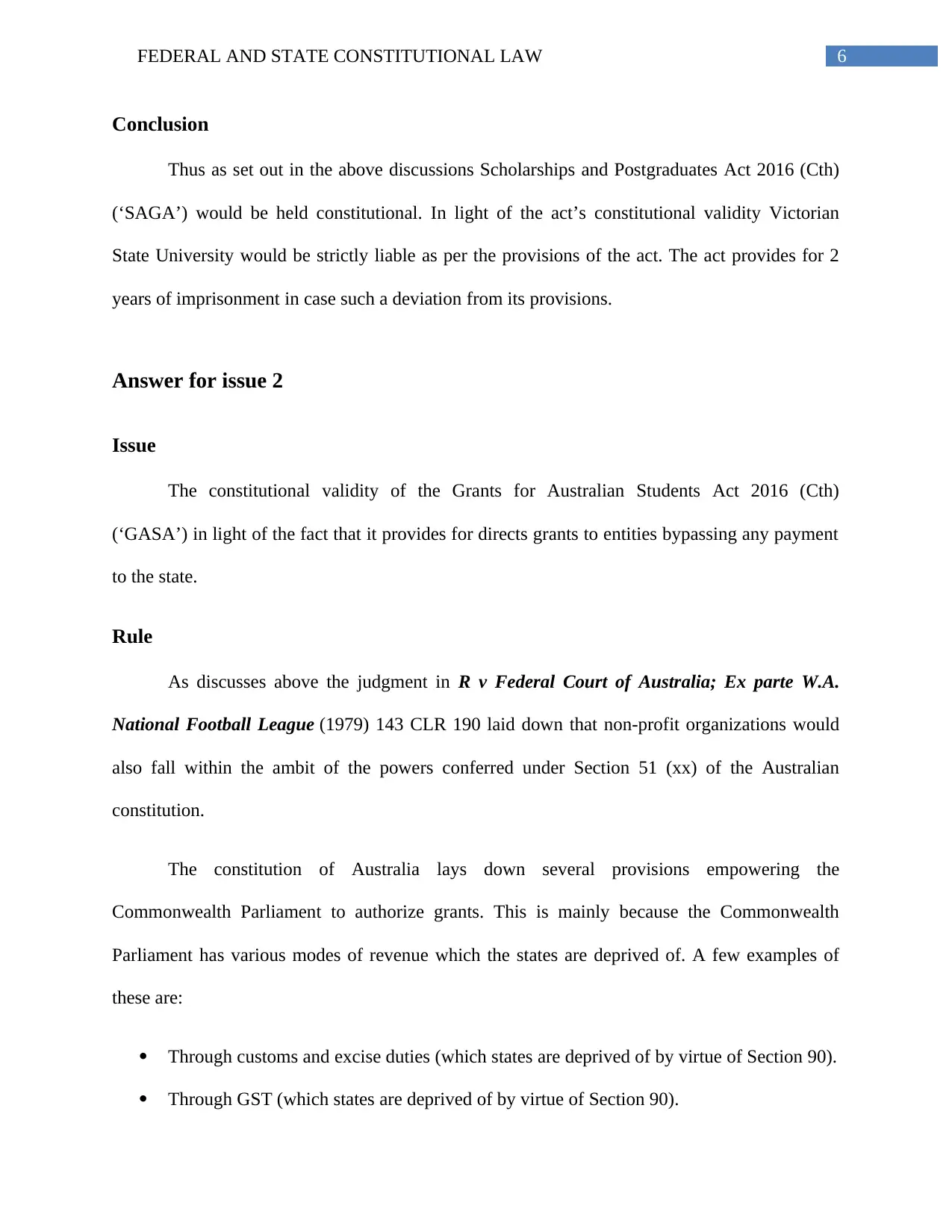
6FEDERAL AND STATE CONSTITUTIONAL LAW
Conclusion
Thus as set out in the above discussions Scholarships and Postgraduates Act 2016 (Cth)
(‘SAGA’) would be held constitutional. In light of the act’s constitutional validity Victorian
State University would be strictly liable as per the provisions of the act. The act provides for 2
years of imprisonment in case such a deviation from its provisions.
Answer for issue 2
Issue
The constitutional validity of the Grants for Australian Students Act 2016 (Cth)
(‘GASA’) in light of the fact that it provides for directs grants to entities bypassing any payment
to the state.
Rule
As discusses above the judgment in R v Federal Court of Australia; Ex parte W.A.
National Football League (1979) 143 CLR 190 laid down that non-profit organizations would
also fall within the ambit of the powers conferred under Section 51 (xx) of the Australian
constitution.
The constitution of Australia lays down several provisions empowering the
Commonwealth Parliament to authorize grants. This is mainly because the Commonwealth
Parliament has various modes of revenue which the states are deprived of. A few examples of
these are:
Through customs and excise duties (which states are deprived of by virtue of Section 90).
Through GST (which states are deprived of by virtue of Section 90).
Conclusion
Thus as set out in the above discussions Scholarships and Postgraduates Act 2016 (Cth)
(‘SAGA’) would be held constitutional. In light of the act’s constitutional validity Victorian
State University would be strictly liable as per the provisions of the act. The act provides for 2
years of imprisonment in case such a deviation from its provisions.
Answer for issue 2
Issue
The constitutional validity of the Grants for Australian Students Act 2016 (Cth)
(‘GASA’) in light of the fact that it provides for directs grants to entities bypassing any payment
to the state.
Rule
As discusses above the judgment in R v Federal Court of Australia; Ex parte W.A.
National Football League (1979) 143 CLR 190 laid down that non-profit organizations would
also fall within the ambit of the powers conferred under Section 51 (xx) of the Australian
constitution.
The constitution of Australia lays down several provisions empowering the
Commonwealth Parliament to authorize grants. This is mainly because the Commonwealth
Parliament has various modes of revenue which the states are deprived of. A few examples of
these are:
Through customs and excise duties (which states are deprived of by virtue of Section 90).
Through GST (which states are deprived of by virtue of Section 90).
⊘ This is a preview!⊘
Do you want full access?
Subscribe today to unlock all pages.

Trusted by 1+ million students worldwide
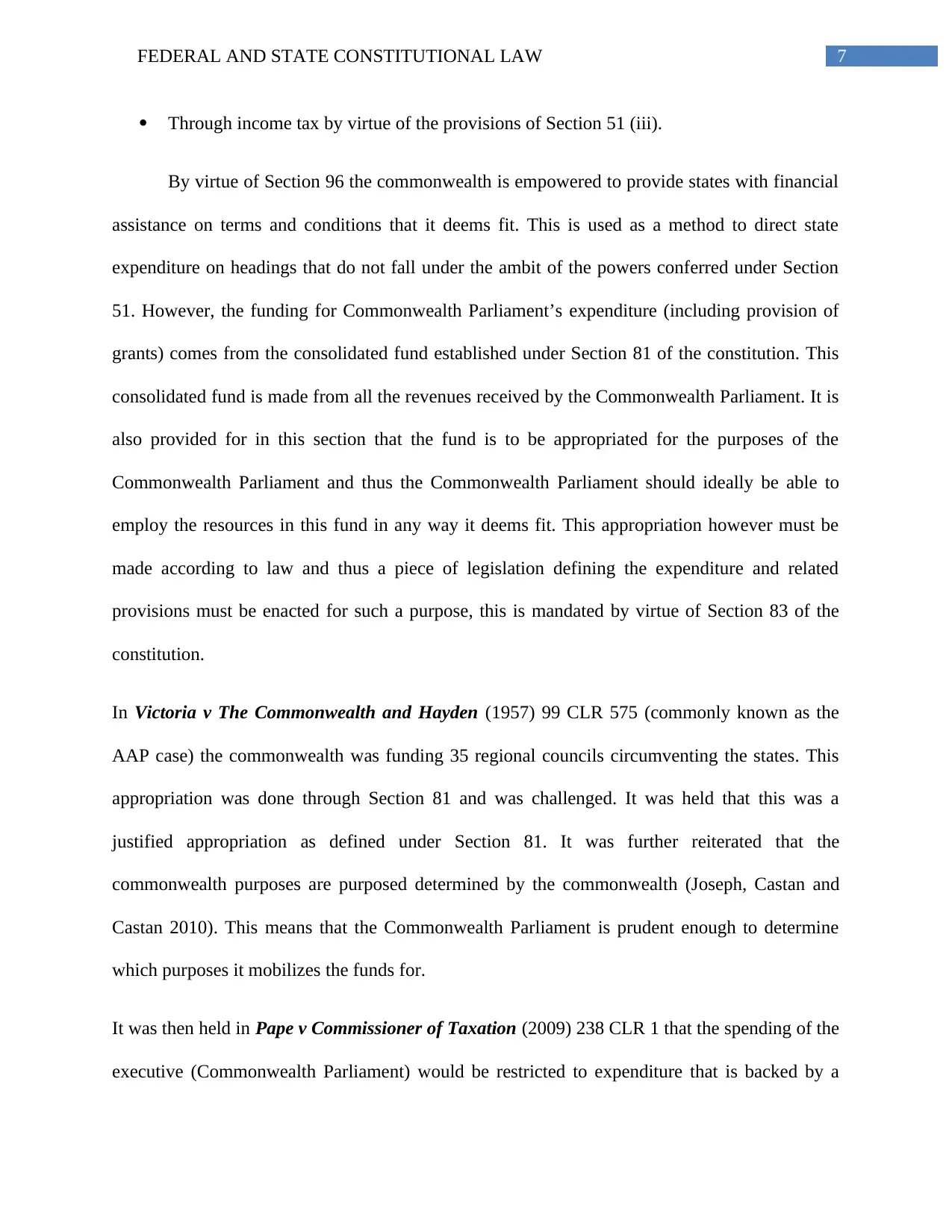
7FEDERAL AND STATE CONSTITUTIONAL LAW
Through income tax by virtue of the provisions of Section 51 (iii).
By virtue of Section 96 the commonwealth is empowered to provide states with financial
assistance on terms and conditions that it deems fit. This is used as a method to direct state
expenditure on headings that do not fall under the ambit of the powers conferred under Section
51. However, the funding for Commonwealth Parliament’s expenditure (including provision of
grants) comes from the consolidated fund established under Section 81 of the constitution. This
consolidated fund is made from all the revenues received by the Commonwealth Parliament. It is
also provided for in this section that the fund is to be appropriated for the purposes of the
Commonwealth Parliament and thus the Commonwealth Parliament should ideally be able to
employ the resources in this fund in any way it deems fit. This appropriation however must be
made according to law and thus a piece of legislation defining the expenditure and related
provisions must be enacted for such a purpose, this is mandated by virtue of Section 83 of the
constitution.
In Victoria v The Commonwealth and Hayden (1957) 99 CLR 575 (commonly known as the
AAP case) the commonwealth was funding 35 regional councils circumventing the states. This
appropriation was done through Section 81 and was challenged. It was held that this was a
justified appropriation as defined under Section 81. It was further reiterated that the
commonwealth purposes are purposed determined by the commonwealth (Joseph, Castan and
Castan 2010). This means that the Commonwealth Parliament is prudent enough to determine
which purposes it mobilizes the funds for.
It was then held in Pape v Commissioner of Taxation (2009) 238 CLR 1 that the spending of the
executive (Commonwealth Parliament) would be restricted to expenditure that is backed by a
Through income tax by virtue of the provisions of Section 51 (iii).
By virtue of Section 96 the commonwealth is empowered to provide states with financial
assistance on terms and conditions that it deems fit. This is used as a method to direct state
expenditure on headings that do not fall under the ambit of the powers conferred under Section
51. However, the funding for Commonwealth Parliament’s expenditure (including provision of
grants) comes from the consolidated fund established under Section 81 of the constitution. This
consolidated fund is made from all the revenues received by the Commonwealth Parliament. It is
also provided for in this section that the fund is to be appropriated for the purposes of the
Commonwealth Parliament and thus the Commonwealth Parliament should ideally be able to
employ the resources in this fund in any way it deems fit. This appropriation however must be
made according to law and thus a piece of legislation defining the expenditure and related
provisions must be enacted for such a purpose, this is mandated by virtue of Section 83 of the
constitution.
In Victoria v The Commonwealth and Hayden (1957) 99 CLR 575 (commonly known as the
AAP case) the commonwealth was funding 35 regional councils circumventing the states. This
appropriation was done through Section 81 and was challenged. It was held that this was a
justified appropriation as defined under Section 81. It was further reiterated that the
commonwealth purposes are purposed determined by the commonwealth (Joseph, Castan and
Castan 2010). This means that the Commonwealth Parliament is prudent enough to determine
which purposes it mobilizes the funds for.
It was then held in Pape v Commissioner of Taxation (2009) 238 CLR 1 that the spending of the
executive (Commonwealth Parliament) would be restricted to expenditure that is backed by a
Paraphrase This Document
Need a fresh take? Get an instant paraphrase of this document with our AI Paraphraser
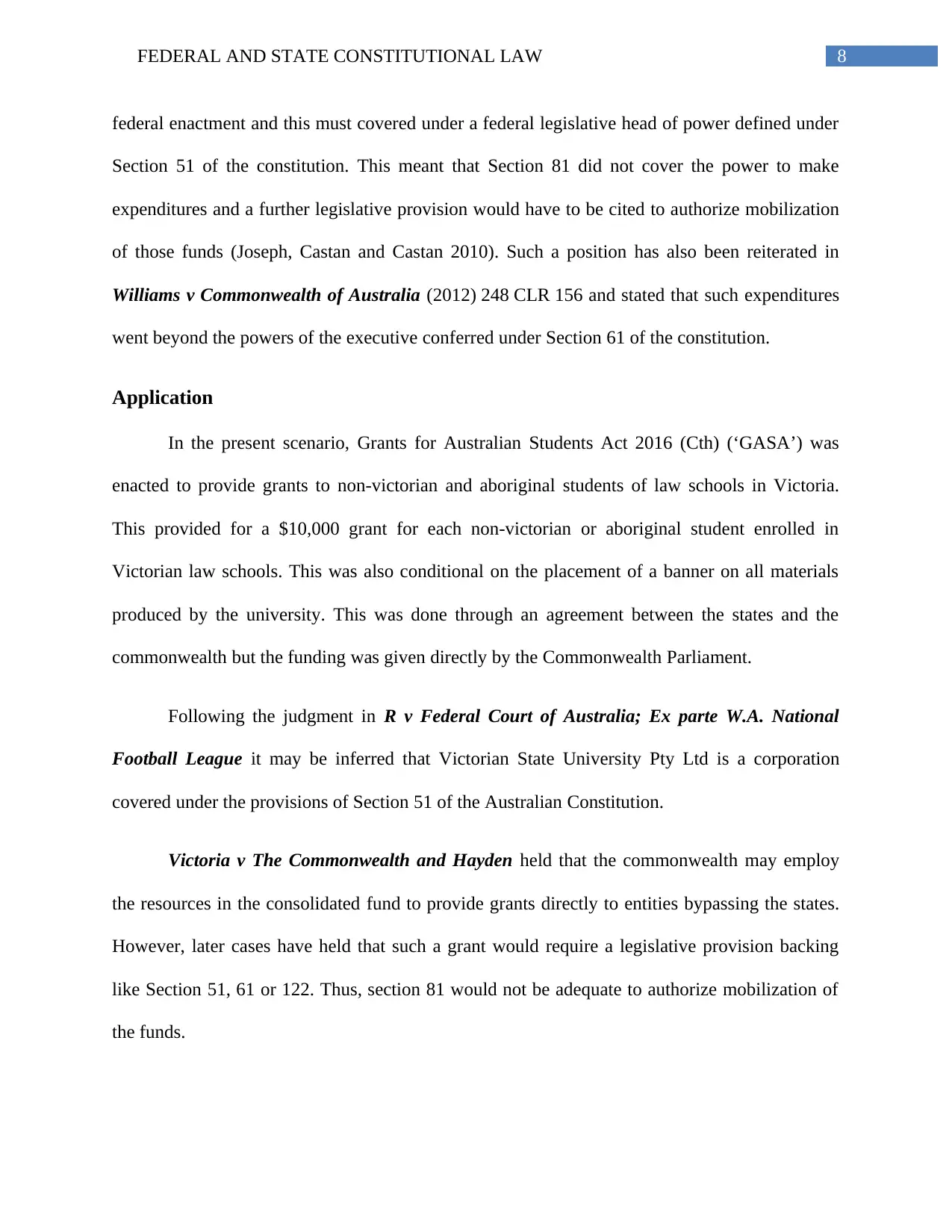
8FEDERAL AND STATE CONSTITUTIONAL LAW
federal enactment and this must covered under a federal legislative head of power defined under
Section 51 of the constitution. This meant that Section 81 did not cover the power to make
expenditures and a further legislative provision would have to be cited to authorize mobilization
of those funds (Joseph, Castan and Castan 2010). Such a position has also been reiterated in
Williams v Commonwealth of Australia (2012) 248 CLR 156 and stated that such expenditures
went beyond the powers of the executive conferred under Section 61 of the constitution.
Application
In the present scenario, Grants for Australian Students Act 2016 (Cth) (‘GASA’) was
enacted to provide grants to non-victorian and aboriginal students of law schools in Victoria.
This provided for a $10,000 grant for each non-victorian or aboriginal student enrolled in
Victorian law schools. This was also conditional on the placement of a banner on all materials
produced by the university. This was done through an agreement between the states and the
commonwealth but the funding was given directly by the Commonwealth Parliament.
Following the judgment in R v Federal Court of Australia; Ex parte W.A. National
Football League it may be inferred that Victorian State University Pty Ltd is a corporation
covered under the provisions of Section 51 of the Australian Constitution.
Victoria v The Commonwealth and Hayden held that the commonwealth may employ
the resources in the consolidated fund to provide grants directly to entities bypassing the states.
However, later cases have held that such a grant would require a legislative provision backing
like Section 51, 61 or 122. Thus, section 81 would not be adequate to authorize mobilization of
the funds.
federal enactment and this must covered under a federal legislative head of power defined under
Section 51 of the constitution. This meant that Section 81 did not cover the power to make
expenditures and a further legislative provision would have to be cited to authorize mobilization
of those funds (Joseph, Castan and Castan 2010). Such a position has also been reiterated in
Williams v Commonwealth of Australia (2012) 248 CLR 156 and stated that such expenditures
went beyond the powers of the executive conferred under Section 61 of the constitution.
Application
In the present scenario, Grants for Australian Students Act 2016 (Cth) (‘GASA’) was
enacted to provide grants to non-victorian and aboriginal students of law schools in Victoria.
This provided for a $10,000 grant for each non-victorian or aboriginal student enrolled in
Victorian law schools. This was also conditional on the placement of a banner on all materials
produced by the university. This was done through an agreement between the states and the
commonwealth but the funding was given directly by the Commonwealth Parliament.
Following the judgment in R v Federal Court of Australia; Ex parte W.A. National
Football League it may be inferred that Victorian State University Pty Ltd is a corporation
covered under the provisions of Section 51 of the Australian Constitution.
Victoria v The Commonwealth and Hayden held that the commonwealth may employ
the resources in the consolidated fund to provide grants directly to entities bypassing the states.
However, later cases have held that such a grant would require a legislative provision backing
like Section 51, 61 or 122. Thus, section 81 would not be adequate to authorize mobilization of
the funds.
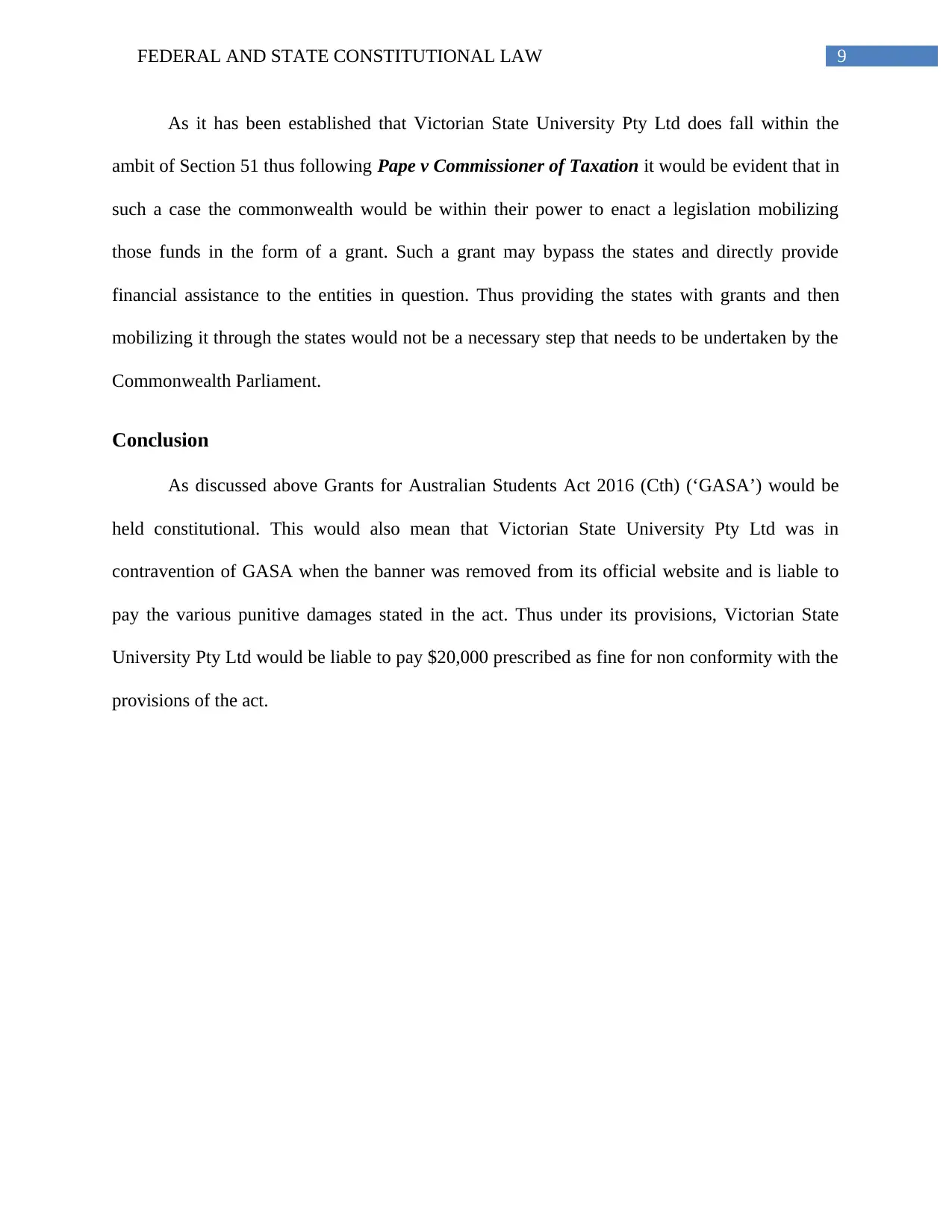
9FEDERAL AND STATE CONSTITUTIONAL LAW
As it has been established that Victorian State University Pty Ltd does fall within the
ambit of Section 51 thus following Pape v Commissioner of Taxation it would be evident that in
such a case the commonwealth would be within their power to enact a legislation mobilizing
those funds in the form of a grant. Such a grant may bypass the states and directly provide
financial assistance to the entities in question. Thus providing the states with grants and then
mobilizing it through the states would not be a necessary step that needs to be undertaken by the
Commonwealth Parliament.
Conclusion
As discussed above Grants for Australian Students Act 2016 (Cth) (‘GASA’) would be
held constitutional. This would also mean that Victorian State University Pty Ltd was in
contravention of GASA when the banner was removed from its official website and is liable to
pay the various punitive damages stated in the act. Thus under its provisions, Victorian State
University Pty Ltd would be liable to pay $20,000 prescribed as fine for non conformity with the
provisions of the act.
As it has been established that Victorian State University Pty Ltd does fall within the
ambit of Section 51 thus following Pape v Commissioner of Taxation it would be evident that in
such a case the commonwealth would be within their power to enact a legislation mobilizing
those funds in the form of a grant. Such a grant may bypass the states and directly provide
financial assistance to the entities in question. Thus providing the states with grants and then
mobilizing it through the states would not be a necessary step that needs to be undertaken by the
Commonwealth Parliament.
Conclusion
As discussed above Grants for Australian Students Act 2016 (Cth) (‘GASA’) would be
held constitutional. This would also mean that Victorian State University Pty Ltd was in
contravention of GASA when the banner was removed from its official website and is liable to
pay the various punitive damages stated in the act. Thus under its provisions, Victorian State
University Pty Ltd would be liable to pay $20,000 prescribed as fine for non conformity with the
provisions of the act.
⊘ This is a preview!⊘
Do you want full access?
Subscribe today to unlock all pages.

Trusted by 1+ million students worldwide
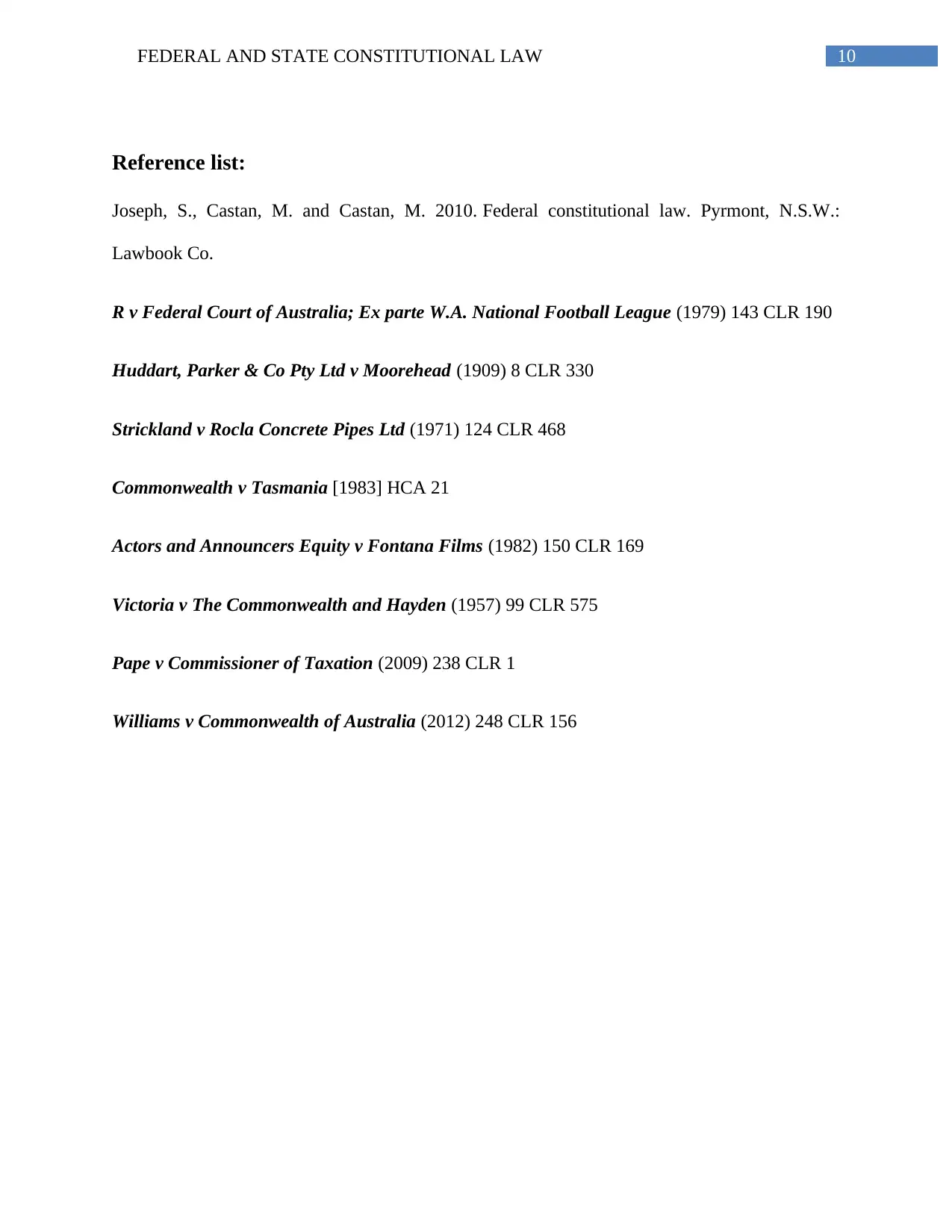
10FEDERAL AND STATE CONSTITUTIONAL LAW
Reference list:
Joseph, S., Castan, M. and Castan, M. 2010. Federal constitutional law. Pyrmont, N.S.W.:
Lawbook Co.
R v Federal Court of Australia; Ex parte W.A. National Football League (1979) 143 CLR 190
Huddart, Parker & Co Pty Ltd v Moorehead (1909) 8 CLR 330
Strickland v Rocla Concrete Pipes Ltd (1971) 124 CLR 468
Commonwealth v Tasmania [1983] HCA 21
Actors and Announcers Equity v Fontana Films (1982) 150 CLR 169
Victoria v The Commonwealth and Hayden (1957) 99 CLR 575
Pape v Commissioner of Taxation (2009) 238 CLR 1
Williams v Commonwealth of Australia (2012) 248 CLR 156
Reference list:
Joseph, S., Castan, M. and Castan, M. 2010. Federal constitutional law. Pyrmont, N.S.W.:
Lawbook Co.
R v Federal Court of Australia; Ex parte W.A. National Football League (1979) 143 CLR 190
Huddart, Parker & Co Pty Ltd v Moorehead (1909) 8 CLR 330
Strickland v Rocla Concrete Pipes Ltd (1971) 124 CLR 468
Commonwealth v Tasmania [1983] HCA 21
Actors and Announcers Equity v Fontana Films (1982) 150 CLR 169
Victoria v The Commonwealth and Hayden (1957) 99 CLR 575
Pape v Commissioner of Taxation (2009) 238 CLR 1
Williams v Commonwealth of Australia (2012) 248 CLR 156
Paraphrase This Document
Need a fresh take? Get an instant paraphrase of this document with our AI Paraphraser
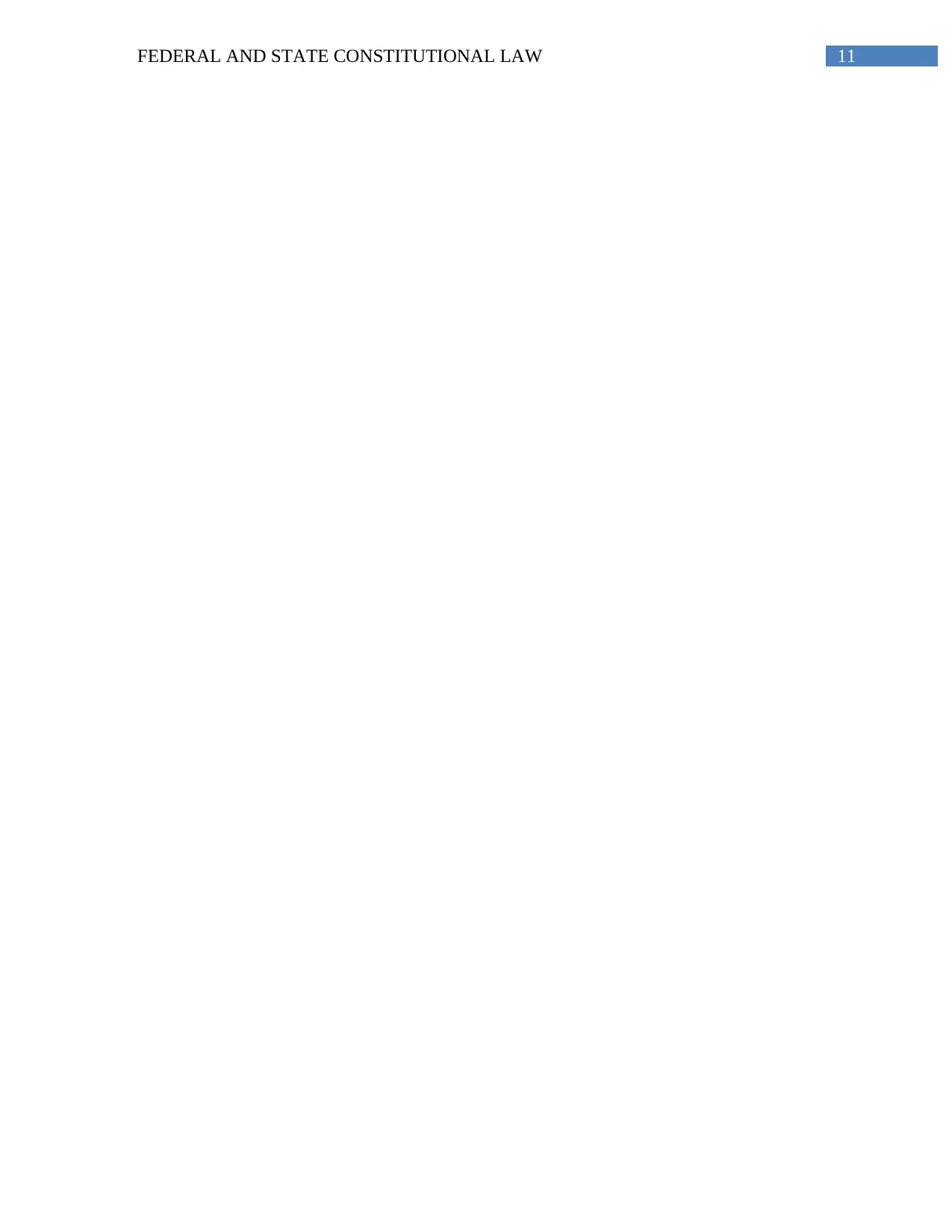
11FEDERAL AND STATE CONSTITUTIONAL LAW
1 out of 11
Related Documents
Your All-in-One AI-Powered Toolkit for Academic Success.
+13062052269
info@desklib.com
Available 24*7 on WhatsApp / Email
![[object Object]](/_next/static/media/star-bottom.7253800d.svg)
Unlock your academic potential
Copyright © 2020–2026 A2Z Services. All Rights Reserved. Developed and managed by ZUCOL.





